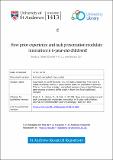Files in this item
How prior experience and task presentation modulate innovation in 6-year-old-children
Item metadata
| dc.contributor.author | Ebel, Sonja J. | |
| dc.contributor.author | Hanus, Daniel | |
| dc.contributor.author | Call, Josep | |
| dc.date.accessioned | 2020-01-09T00:37:50Z | |
| dc.date.available | 2020-01-09T00:37:50Z | |
| dc.date.issued | 2019-04 | |
| dc.identifier | 257381272 | |
| dc.identifier | e958e8d8-8124-4458-9423-7cde8730d7f7 | |
| dc.identifier | 85059624210 | |
| dc.identifier | 000458469200006 | |
| dc.identifier.citation | Ebel , S J , Hanus , D & Call , J 2019 , ' How prior experience and task presentation modulate innovation in 6-year-old-children ' , Journal of Experimental Child Psychology , vol. 180 , pp. 87-103 . https://doi.org/10.1016/j.jecp.2018.12.004 | en |
| dc.identifier.issn | 0022-0965 | |
| dc.identifier.other | RIS: urn:8437190C8F9535A86B7864D56DD89FD5 | |
| dc.identifier.other | ORCID: /0000-0002-8597-8336/work/52888778 | |
| dc.identifier.uri | https://hdl.handle.net/10023/19253 | |
| dc.description | This research was funded by the Max Planck Society. | en |
| dc.description.abstract | Low innovation rates have been found with children until 6–8 years of age in tasks that required them to make a tool. Little is known about how prior experience and task presentation influence innovation rates. In the current study, we investigated these aspects in the floating peanut task (FPT), which required children to pour water into a vertical tube to retrieve a peanut. In three experiments, we varied the amount of plants that 6-year-olds (N = 256) watered prior to the task (zero, one, or five plants), who watered the plants (child or experimenter), and the distance and salience of the water source. We expected that prior experience with the water would modulate task performance by either boosting innovation rates (facilitation effect) or reducing them given that children would possibly learn that the water was for watering plants (functional fixedness effect). Our results indicate robustly low innovation rates in 6-year-olds. However, children’s performance improved to some extent with increased salience of the water source as well as with an experimenter-given hint. Due to the low innovation rates in this age group, we investigated whether watering plants prior to the FPT would influence innovation rates in 7- and 8-year-olds (N = 33), for which we did not find evidence. We conclude that 6-year-olds struggle with innovation but that they are more likely to innovate if crucial aspects of the task are made more salient. Thus, although 6-year-olds can innovate, they require more physical and social scaffolding than older children and adults. | |
| dc.format.extent | 17 | |
| dc.format.extent | 1003414 | |
| dc.language.iso | eng | |
| dc.relation.ispartof | Journal of Experimental Child Psychology | en |
| dc.subject | Causal understanding | en |
| dc.subject | Floating peanut task | en |
| dc.subject | Functional fixedness | en |
| dc.subject | Innovation | en |
| dc.subject | Primates | en |
| dc.subject | Prior experience | en |
| dc.subject | BF Psychology | en |
| dc.subject | NDAS | en |
| dc.subject.lcc | BF | en |
| dc.title | How prior experience and task presentation modulate innovation in 6-year-old-children | en |
| dc.type | Journal article | en |
| dc.contributor.institution | University of St Andrews. School of Psychology and Neuroscience | en |
| dc.contributor.institution | University of St Andrews. Centre for Social Learning & Cognitive Evolution | en |
| dc.identifier.doi | 10.1016/j.jecp.2018.12.004 | |
| dc.description.status | Peer reviewed | en |
| dc.date.embargoedUntil | 2020-01-09 |
This item appears in the following Collection(s)
Items in the St Andrews Research Repository are protected by copyright, with all rights reserved, unless otherwise indicated.

